Apr 16, 2011
Spring storm brings Blizzard and 225 tornado reports
Blizzard shuts I-80 in Nebraska, strands motorists
Fri, Apr 15 2011
OMAHA, Nebraska (Reuters) - A spring blizzard dumped up to 16 inches of snow in Nebraska, stranding dozens of motorists and forcing the closure of state’s main highway, Interstate 80, for a 120 mile stretch, officials said on Friday.
Nebraska officials urged motorists to stay put on I-80, which was closed Thursday night and remained shut down Friday afternoon to allow authorities to clear stranded vehicles, mainly from a 12-mile construction zone.
The construction zone between Paxton and Ogallala, Nebraska, had many stranded semi-trailer trucks. A handful of accidents were reported, but no serious injuries, Nebraska State Patrol spokeswoman Deb Collins said.
It will still be slow driving conditions in the area once the roads are reopened, Collins said.
“We have traffic backing up at interstate closure points both east and west and basically they have nowhere to go,” Troop D Commander Captain Jim Parish said.
Falling tree limbs weighted with heavy, wet snow pulled down power lines and snapped power poles in the region where the states of Nebraska, Kansas and Colorado meet.
The storm started as rain in some areas and developed to snow overnight with surface winds increasing to blizzard conditions across southwest Nebraska by Thursday evening, the National Weather Service said.

Enlarged.
Paxton, Nebraska, was hit by 16 inches of snow and drifts in west central Nebraska reached 5 feet deep, the weather service said.
225 reported Tornadoes through the south and east Thursday through Saturday

Enlarged.
The storm, typical of strong La Ninas in the cold PDO brought 225 reports of tornadoes through early this morning (Sunday). The last few days Oklahoma and the south were under the gun (see this animation of the storms in Oklahoma thanks to Ryan Maue).
Here is the SPC preliminary storm tracking for the 14th.
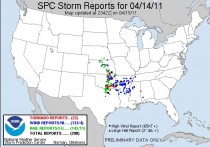
Enlarged.
Here on the 15th we see the storms further east.
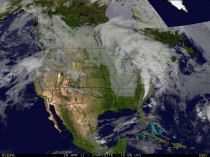
Enlarged.
Here is the preliminary SPC storm tracking for the 15th
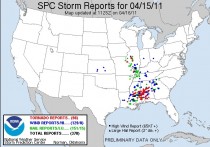
Enlarged.
And here is Saturday, the 16th with 105 more tornado reports to bring the 3 day preliminary total of tornado reports to 225!

Enlarged.
See more reasons why on WeatherBell and see in the first post in mid March why we thought this would be a very active tornado season, subject to major outbreaks. See Joe Bastardi’s video on why there are more tornadoes this year.
Apr 15, 2011
A rational choice of energy sources
The Scientific Alliance Newsletter
Despite the intense debates which occur about the merits of different sources of electricity, the fact is that governments have an obligation to keep the lights on for their citizens. Modern societies need a constant supply of energy so that businesses can operate efficiently and individuals can be safe and comfortable. Even short power cuts can be very disruptive: computers stop working, broadband connections are lost, modern phones will not work, central heating pumps and boilers cut out and candles and torches are the only sources of light. Imagine if this was a regular occurrence.
This power, of course, does not always have to be generated in the same way. Many countries have moved from an almost total reliance on coal towards greater use of gas. Nuclear is part of the mix for many and France has chosen to make it its primary source of energy. For countries with the right geography, such as Norway, hydroelectricity is the obvious answer and in a few cases (eg Iceland) geothermal power is viable. But in all cases, a mix has been arrived at which can - barring occasional problems - provide energy security at a reasonable price.
This could change over the next few years. The current drive to reduce the carbon intensity of power generation ahead of whatever changes free market forces might bring risks placing undue reliance on intermittent sources of power, particularly wind generation, which is the most mature and generally the least expensive of the non-nuclear alternative options. Even enthusiasts agree that the intrinsically intermittent nature of the wind means that turbines on average only generate a fraction of their nominal capacity. What is still a very controversial issue is the extent to which this can be accommodated within an overall generating mix.
The John Muir Trust, which describes itself as the ‘leading wild land conservation charity in the UK’ has therefore done a valuable service by commissioning a report on the topic from Stuart Young, called (accurately but somewhat prosaically) Analysis of UK Wind Power Generation; November 2008 to December 2010. Using publicly-available information, this analyses the data to give a rather less positive assessment than we get from organisations such as Renewable UK (until recently the British Wind Energy Association, but now also covering wave and tidal power) or the Renewable Energy Association. It will not have pleased Alex Salmond, First Minister of Scotland, who spoke at a recent conference of ‘putting Scotland at the forefront of the global energy revolution’.
Critics may say that the John Muir Trust has an axe to grind, because it does not want to see wind turbines erected in what is currently wilderness. This is a fair point, but very few reports are published for purely altruistic reasons and it is for the reader to judge for themselves the objectivity of the author. In the case of the JMT report, the facts are allowed to speak for themselves. The National Grid, via its Balancing Mechanism Reporting System, provides very detailed data, publishing information every five minutes since November 2008. This data can be accessed by anyone, including those who may be sceptical of Stuart Young’s conclusions.
The author set out to test a series of statements often made in support of wind power and, in so doing, came to some important conclusions about its ability to make a useful contribution to the mix. For example, based on these data, he concludes that a figure of 30% of rated capacity for the average outputs of on-shore wind farms is a significant over-estimate. For November and December 2008, the figure was 31.7%, but in 2009 it fell to 27.2% and in 2010 was only 21.1%. Over the whole period covered, the average was just 24.1%. It should be said that the NG figures include only metered wind farms, but these are all in Scotland, which we can safely assume to be windier than the UK average. Including on-shore wind turbines in England would only make the picture worse.
This is one aspect; in terms of planning investment, it would be safe to assume that on-shore wind farms would have an average output of only about a quarter of their rated capacity. But even more important is the variability of the output. It has already been argued many times that wind farms can do little to reduce carbon dioxide emissions because conventional generating capacity has to be kept running inefficiently on standby to make up the shortfall when the wind is too weak (or too strong). The ability of the grid to cope with large, rapid changes in supply has also been questioned.
The analysis in the report gives a good illustration of this. To summarise, the metered wind farms operate:
At below 20% of capacity more than half the time
Below 10% of capacity more than one-third of the time
The equivalent of one day in twelve below 2.5% capacity
The equivalent of just under one day a month below 1.25% capacity
To compound this, the total output from the wind farms (about 1600MW metered capacity) was less than 20MW on average more than once a week, and this low output typically lasted for nearly five hours on each occasion. To compound this “Movements in excess of 100MW over a five minute period are relatively common even at the low levels of metered capacity during the study period. As more wind power is connected the magnitude of rapid changes will increase.”
Some people will see this report and its conclusions as an attack on wind power. I prefer to see it as a recognition of the reality and an aid to rational decision making. If the objective is to reduce the carbon intensity of electricity generation, it makes no sense to wilfully ignore the negative aspects of particular technologies. To do so would be to saddle the country with a power grid which is not fit for purpose.
Even enthusiasts for renewables should take proper note of these issues. Professor David MacKay, Cambridge academic and currently Chief Scientific Adviser at the UK Department of Energy and Climate Change is both a committed environmentalist and an excellent and rational scientist. For those who want to look at the broader issues of energy generation and use in more detail, the first point of call should be his extremely useful (and free in pdf form) book Sustainable energy - without the hot air. Rather than make the sort of unwarranted assumptions some are prone to do, he estimates capacities and outputs from first principles. Both he and Stuart Young have made invaluable contributions to the debate and we can only hope that they are the voices which are listened to.
Apr 14, 2011
Greens target women to save their failing cause with the ‘toxic’ lie
Environmental groups battling to protect U.S. EPA’s power over climate rules today launched a strategy with a new ally: women.
The Sierra Club and League of Women Voters plan to hold a series of phone briefings targeting 500,000 women in seven states, talking to them about what the green groups see as the risks to health if EPA loses its authority over air rules. Dubbed the “Talking About Toxics Program,” it is an effort to reframe the debate.
The organizations, which already had shifted to focusing on health versus climate, will be talking about “health and families,” according to a strategy document obtained by Greenwire.
“The environmental and health communities need to do more to build on our success at framing the fight to limit dangerous industrial pollution around public health,” the document says. “If Congress refuses to believe the research, we should put our strongest voices forward to tell the story about the vast harm toxic air pollutants, including particulate matter, ozone, mercury, formaldehyde, arsenic, lead and carbon can do to families.
“We need to reach out to more women and mobilize those women to weigh in on both the administrative and legislative fights,” it adds.
The first “tele-town hall” is scheduled for this evening in Ohio. Others tentatively are planned for Michigan, Pennsylvania, Minnesota, Missouri, Colorado and Massachusetts. Those are considered states with key lawmakers in the brawls over EPA’s power.
The calls come as Congress continues to target the agency and as supporters and opponents submit comments on EPA’s proposed toxic air pollution rule (Greenwire, April 13).
The agency’s funding was whacked 16 percent as part of the budget deal for the rest of fiscal 2011, and many in the GOP have pledged not to let up. Senate Republicans have vowed the return of amendments that sought to limit EPA’s ability to regulate greenhouse gases. Those measures failed to win passage in votes last week (E&ENews PM, April 12).
An amendment from Senate Minority Leader Mitch McConnell (R-Ky.), which would have stripped EPA of its climate oversight, drew 50 votes, while other senators backed measures that would temporarily suspend EPA’s powers.
“Over 60 members of the Senate have said the EPA has gone too far,” Sen. John Barrasso (R-Wyo.) said earlier this week. “And we’re going let those people make sure their voices are heard.”
EPA supporters devised the new strategy late last month during debates over EPA’s funding and power.
“The other side is engaged in a war on the science and an all-out assault on EPA and the Clean Air Act,” said David Di Martino, CEO of Blue Line Strategic Communications Inc., a consulting firm for supporters of EPA action on greenhouse gases. “To counter this, the calls will connect for a very powerful voting block the EPA/Clean Air fight to the public health and well-being of their families.”
The green groups say surveys show women support EPA action on climate gases.
A February poll by Geoff Garin for the League of Conservation Voters found that “women support new EPA standards limiting carbon emissions 71 to 20,” according to the strategy document. Democratic women support the EPA action 82-9 percent and Republican women support it 56-35, the document said. It did not provide a margin of error.
The calls will focus heavily on health. In addition to asking medical experts to participate, organizers plan to “anchor the calls in personal stories about local women living with air pollution, asthma and respiratory illness,” the document said, and “incorporate local asthma respiratory costs and deaths and name the sources of local air toxics that affect health.”
Some argue the link between health and EPA rules is misplaced.
“There’s a public perception that carbon dioxide and greenhouse gas emissions [are] what is spewing out of smokestacks at factories,” said Nick Loris, policy analyst at the Heritage Foundation, a conservative think tank. “The reality is carbon dioxide is a naturally occurring component of the air and is also the ubiquitous and unavoidable result of fossil fuel production and other naturally occurring events.
“That leads to the misconception that the EPA is regulating emissions that are directly linked to human health and safety,” Loris added, saying there is “very real scientific dissension” as to whether carbon dioxide is a threat to health or having an impact on climate change.
But environmental groups say they have statistics to support their health claims, including EPA data stating that the mercury and air toxics standards in 2016 will save as many as 17,000 lives and prevent 45,000 cases of bronchitis, 11,000 nonfatal heart attacks, 120,000 acute asthma attacks and 12,200 hospital visits. Others have challenged those numbers as flawed.
Despite the debate over the accuracy, the approach on the tele-town halls might succeed, Loris said.
“Because there is misinformation or a lack of understanding about what carbon dioxide does, I think that works to their benefit,” Loris said.
The tele-town halls aim to frame the debate around families and health; engage women in the fight and highlight their support for clean air standards; protect EPA and Clean Air Act authority; and counter the “media narrative in DC that follows the denier playbook of undermining the EPA and Clean Air Act,” according to the strategy document.
The calls will contact women in each of the states using voter files, Di Martino said. Each telephone town hall will call about 100,000 households and people answering can decide whether to participate. People on the first call will not be asked to lobby their lawmakers, Di Martino said, adding “this first call is educational—about the need for updated clean air standards. Other calls may follow a similar or different format.”
Swinging at Ohio
Ohio, where tonight’s call will take place, illustrates some of the clash over EPA’s authority. House Speaker John Boehner (R-Ohio), Republican House members and Sen. Rob Portman (R-Ohio) have backed limits to EPA’s authority. Portman voted for McConnell’s amendment.
The state’s Democratic senator, Sherrod Brown (D-Ohio), opposed McConnell’s measure but supported a failed amendment from Sen. Debbie Stabenow (D-Mich.) that would have delayed EPA’s greenhouse gas regulations for two years. Brown, who is up for re-election in 2012, said he felt no pressure to support a permanent stay on EPA rules.
“I believe that climate change is real, I believe the science is sound, I believe it’s a moral issue,” Brown said last week. “I want to move forward with it as much as we can, but I want the administration to answer the questions of how to keep these jobs from going overseas.”
Ohio is a swing state that will be important in 2012 and has seen a shift from Democrats to Republicans, said Paul Beck, political science professor at Ohio State University.
“The other thing about Ohio that may be as important is that it’s a state that makes a heavy use of coal in producing its electricity and for other purposes,” Beck said. “The Clean Air Act very much ties in to or attempts to regulate and restrict emissions that come from coal fired plants. It’s a hot issue in Ohio because of its use of coal.”
The political mood in the state has generally been opposed to climate regulations, he said, with concerns about higher costs for consumers and manufacturers.
But in some parts of Ohio, Beck said, “the rates of disease and illness from bad air are certainly higher than they are nationwide as an average. So it is an issue.
“If I were running this campaign, I would focus on Ohio,” Beck said. “There’s a potential here to change the mood.”
Beck said he has seen data showing women are more supportive of clean air regulations.
“Women are much more sensitive to this issue than men appear to be, so it’s probably smart in the initial part of this campaign to target women,” Beck said.
Each hourlong tele-town hall will be structured in a series of rolling 10-minute segments on various pollutants. Each one will discuss “how the new Clean Air standards protect everyone from grandparents to kids.” Some of the tele-town halls will focus on the new mercury and air toxic rule while others will home in on attempts to block or limit EPA’s authorities under the Clean Air Act.
The groups plan to “explain to [call] participants how ... standards proposed by the Environmental Protection Agency lower dangerous emissions and address health concerns and what is at stake if the big polluter lobby is successful in blocking updated standards,” the strategy document said
Apr 13, 2011
Cold weather destroying ozone in the Arctic
By Robert W. Felix
BBC ever so subtly tries to blame humans - MSNBC uses a hammer
5 April 2011 - “The ozone layer has seen unprecedented damage in the Arctic this winter due to cold weather in the upper atmosphere,” says this article by BBC environmental correspondent Richard Black.
“By the end of March, 40% of the ozone in the stratosphere had been destroyed, against a previous record of 30%,” says Black.
Severe ozone depletion has been seen over Scandinavia, Greenland, and parts of Canada and Russia.
It must have pained the BBC to publish this, because their headline - “Arctic ozone levels in never-before-seen plunge” - carefully avoids the word “cold.”
However, I will give them credit for admitting - in the very first paragraph - that the damage is due to cold weather in the upper atmosphere.
Then, in an apparent attempt to switch the focus onto humans, Black reminds us that ozone “is destroyed by reactions with industrial chemicals.” He also speaks of the Montreal Protocol, which was meant to control the amount of (supposed) ozone-depleting gases that we nasty humans pump into the atmosphere.
“So it’s really a combination of the gases still there and low temperatures and then sunshine, and then you get ozone loss,” says Black, quoting Geir Braathen with the World Meteorological Organization (WMO).
“We have some winters that get much colder than before and also the cold periods last longer, into the spring,” said Braathen. “The destructive reactions are promoted by cold conditions (below -78C) in the stratosphere.”
Did you know that cold weather had anything to do with the so-called “ozone hole”?
“Usually in cold winters we observe that about 25% of the ozone disappears, but this winter was really a record - 40% of the column has disappeared,” said Dr Florence Goutail from the French National Centre for Scientific Research.
Winters getting colder
“Research by Markus Rex from the Alfred Wegener Institute in Germany suggests that winters that stand out as being cold in the Arctic stratosphere are getting colder.”
“For the next few decades, the [Arctic ozone] story is driven by temperatures, and we don’t understand what’s driving this [downward] trend,” he said.
“It’s a big challenge to understand it and how it will drive ozone loss over coming decades.”
An annual occurrence in the Antarctic
Though this is apparently a new phenomenon in the Arctic, ozone depletion triggered by the cold occurs annually in the Antarctic,” says Black. “The longer and colder Antarctic winters often see 55% of the ozone depleted.”
MSNBC mentions colder weather only once
Meanwhile, MSNBC also covered this subject. On the same day, as a matter of fact. But for some reason, they mentioned the colder weather only once.
Only once!
Colder weather in the upper atmosphere is the whole point of the story - and they mention it only once! Sort of an unimportant filler. They actually make it look as if chlorofluorocarbons (CFCs) are the causing factor.
The record ozone loss “comes despite the “very successful” Montreal Protocol aimed at cutting production and consumption of ozone-destroying chemicals such as chlorofluorocarbons (CFCs) and halons,” the MSNBC article warns.
“The substances were once present in refrigerators, spray cans and fire extinguishers, but have been phased out.” (Talk about trying to blame humans!)
“Nevertheless, due to the long lifetimes of these compounds in the atmosphere, it will take several decades before their concentrations return to pre-1980 levels.”
MSNBC entitled their article “Scientists: Arctic ozone depletion ‘unprecedented.” Their title, as with the BBC’s, makes no mention of cold weather being the cause.
Compare the two articles. I think you’ll be amazed at MSNBC’s duplicity.
See entire BBC article.
See entire MSNBC article.
Robert W. Felix is publisher of www.iceagenow.com and author of Not by Fire but by Ice, in which he maintains that the next ice age could begin any day. In fact, he believes it has already begun.
Just for fun, also see The Ozone Hole Scam Rolls On
Apr 10, 2011
South Central United States Drought
By Joseph D’Aleo, CCM
The South Central United States has been in a significant drought this past 6 months. In parts of the western Gulf, deficits the last 6 months exceed 20 inches (first map). Note that the western areas are semi-arid so the deficits are much smaller in absolute terms but are very dry in percent relative to normal (second map).
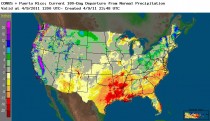
Enlarged.
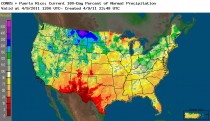
Enlarged.
Soil moisture anomalies as of April 8th reflect these deficits.
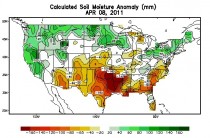
Enlarged.
The driest October through March periods in the Southern Region (as defined by the following NCDC map) ending in March of the year shown are listed below the map. The bold years are the analogs for last winter. Note also that 13 of the 20 top driest years (average 6 month precipitation for the region shown in inches) were La Nina and all but one of the other neutral (La Nada) seasons.
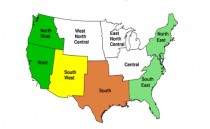
Enlarged.

Enlarged.
2010/11 ranked fourth driest. When the media tries to blame global warming, please note only 1996, 2000 and 2006 appear on the list from the last 30 years.
The National Drought Mitigation Center (UNL) drought monitor analysis as of last week showed this region was in trouble extending back to the western plains. The numbers have been growing week to week as drought tends to beget drought.
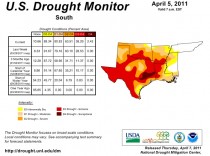
Enlarged.
Taking the top years and compositing them for May to August indicates the precipitation should stay subnormal. It would take a landfalling tropical system to make a quick dent in the deficits (not impossible given the warm Gulf although composites suggest Rio Grande track).

Enlarged.
Look also at temperatures for the top 20 dry years. The small number suggests variance but the pattern is familiar.
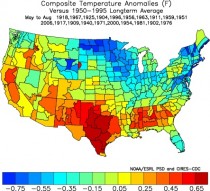
Enlarged.
It looks like our analog forecast and also amazingly like the CPC Soil Moisture forecast for June through August.
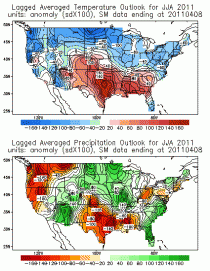
Enlarged.
We will discuss impacts in our ag summaries. Both daily blogs for Joe Bastardi and I and sample ag summaries are available for all for a few more weeks at http://www.weatherbell.com/ (blogs in the premium section). We are both holding back on how much forecast detail we provide that will be available for clients. Both of us will be doing written and video blogs.
|

















